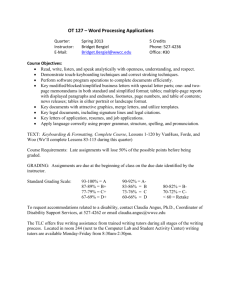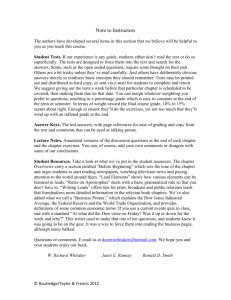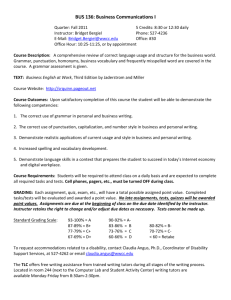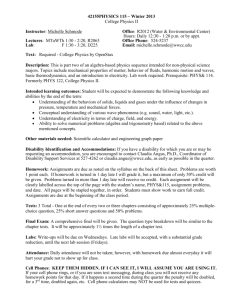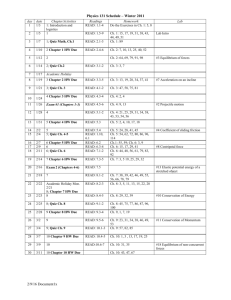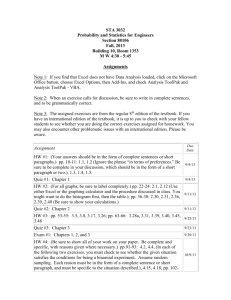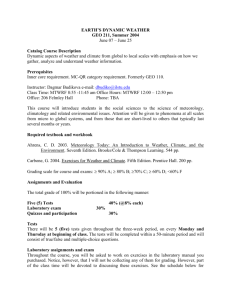View Syllabus
advertisement
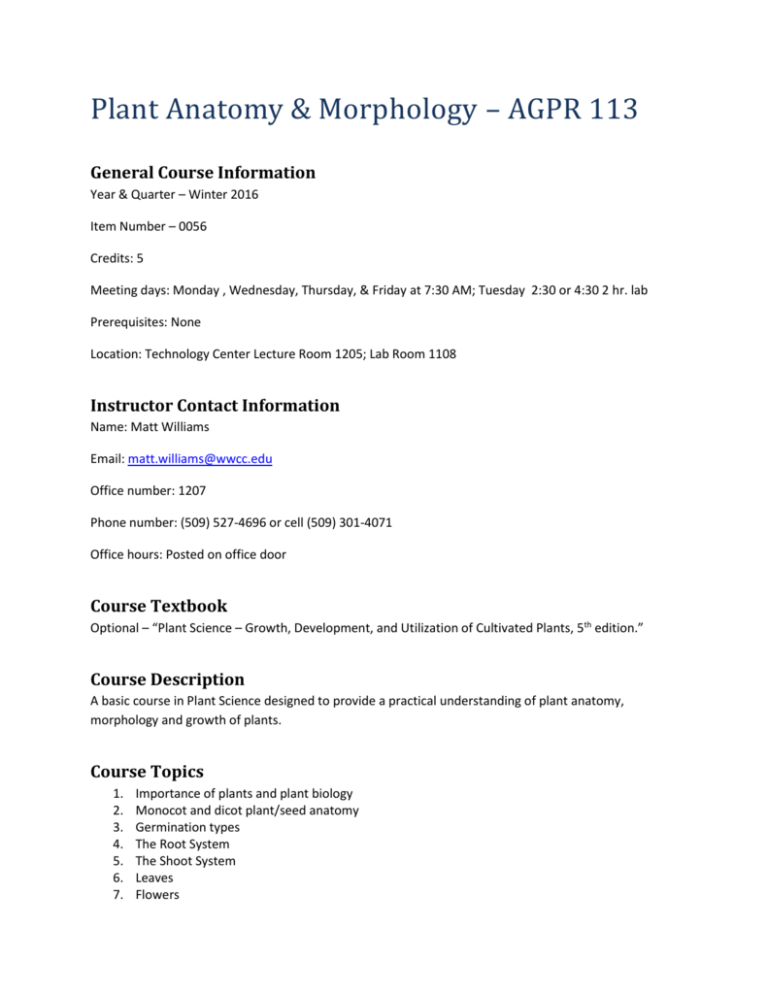
Plant Anatomy & Morphology – AGPR 113 General Course Information Year & Quarter – Winter 2016 Item Number – 0056 Credits: 5 Meeting days: Monday , Wednesday, Thursday, & Friday at 7:30 AM; Tuesday 2:30 or 4:30 2 hr. lab Prerequisites: None Location: Technology Center Lecture Room 1205; Lab Room 1108 Instructor Contact Information Name: Matt Williams Email: matt.williams@wwcc.edu Office number: 1207 Phone number: (509) 527-4696 or cell (509) 301-4071 Office hours: Posted on office door Course Textbook Optional – “Plant Science – Growth, Development, and Utilization of Cultivated Plants, 5th edition.” Course Description A basic course in Plant Science designed to provide a practical understanding of plant anatomy, morphology and growth of plants. Course Topics 1. 2. 3. 4. 5. 6. 7. Importance of plants and plant biology Monocot and dicot plant/seed anatomy Germination types The Root System The Shoot System Leaves Flowers 8. Soil Course Learning Outcomes Students will demonstrate the ability to: 1. 2. 3. 4. 5. Illustrate the diversity and importance of plants. Morphologically identify roots, stems, leaves, flowers, fruits, and seeds. Identify and explain abiotic and biotic influences on plant growth. Compare and contrast the processes of plant growth for multiple species. Assess the use and value for a particular plant in a given ecosystem. Grading Grades will be calculated on a total point basis earned during the quarter and based on a percentage of approximately 1000 total points. Quizzes - 600 points Study questions - 200 points Lab exercises - 200 points Letter grades will be earned according to the following : >93% = A 90-92% = A- 87-89% = B+ 83-86% = B 80-82% = B- 77-79% = C+ 73-76% = C 70-72% = C- 67-69% = D+ 60-66% = D Evaluation Devices: Four announced quizzes; completion of lab exercises, and study questions. Testing Policy: Four announced in class exams and a comprehensive final. The lowest exam score is dropped. Homework Policy: Completion of lab exercises and assignments as assigned outside of class time. Late work will receive a maximum of 50% credit. Other Special Instructions: Lab exercises cannot be made up. Student must perform lab to receive credit for that exercise. Attendance Policy No formal attendance is taken, however, regular attendance and achievement of course learning outcomes is highly correlated. Classroom Behavior It is expected that student behavior will be consistent with the Student Code of Conduct as outlined in the Student Handbook. Conduct yourself in a professional manner consistent with a college environment; this includes eliminating rude or disruptive behavior such as engaging in side conversations. Make the commitment to attend each class section, arrive to class on time and be prepared with all necessary materials. If it is necessary to leave or enter the classroom while class is in session, please consider the learning environment of other students and do so quietly with as little disruption to others as possible. Please keep cell phones silent. Instructor Policies No electronics of any kind may be used during an exam, this includes music players and cell phones, a basic calculator may be used if necessary for completion of the exam. Late assignments will receive no more than 50% of available credit. There will be four exams during the quarter and a comprehensive final exam on the scheduled day and time (Wednesday, March 16, 2016 at 12:30). The lowest exam performance will be dropped. Accomodations To request accommodations related to a disability, contact Claudia Angus, Ph.D., Coordinator of Disability Support Services, at 527-4262 or email claudia.angus@wwcc.edu Course Outline and Suggested Readings 1) Importance of plants, plant biology and classification – Preface (vi-vii), pp. 2-15 & pp. 197-202 2) Monocot and Dicot Seed Anatomy – pp. 78-81, pp. 106-107, & p. 136 3) Types of Germination and Meristems – pp. 83-85 a) QUIZ #1 4) The Root System – pp. 89-92 & pp. 118-119 5) The Shoot System – pp. 92-97 & pp. 119-122 a) QUIZ #2 6) Leaves – pp. 97-100 a) QUIZ #3 7) Flowers & Soil– pp. 100-107 & p. 129 a) QUIZ #4
